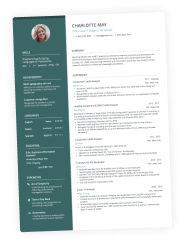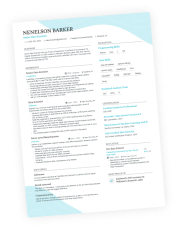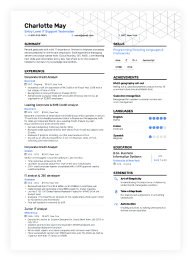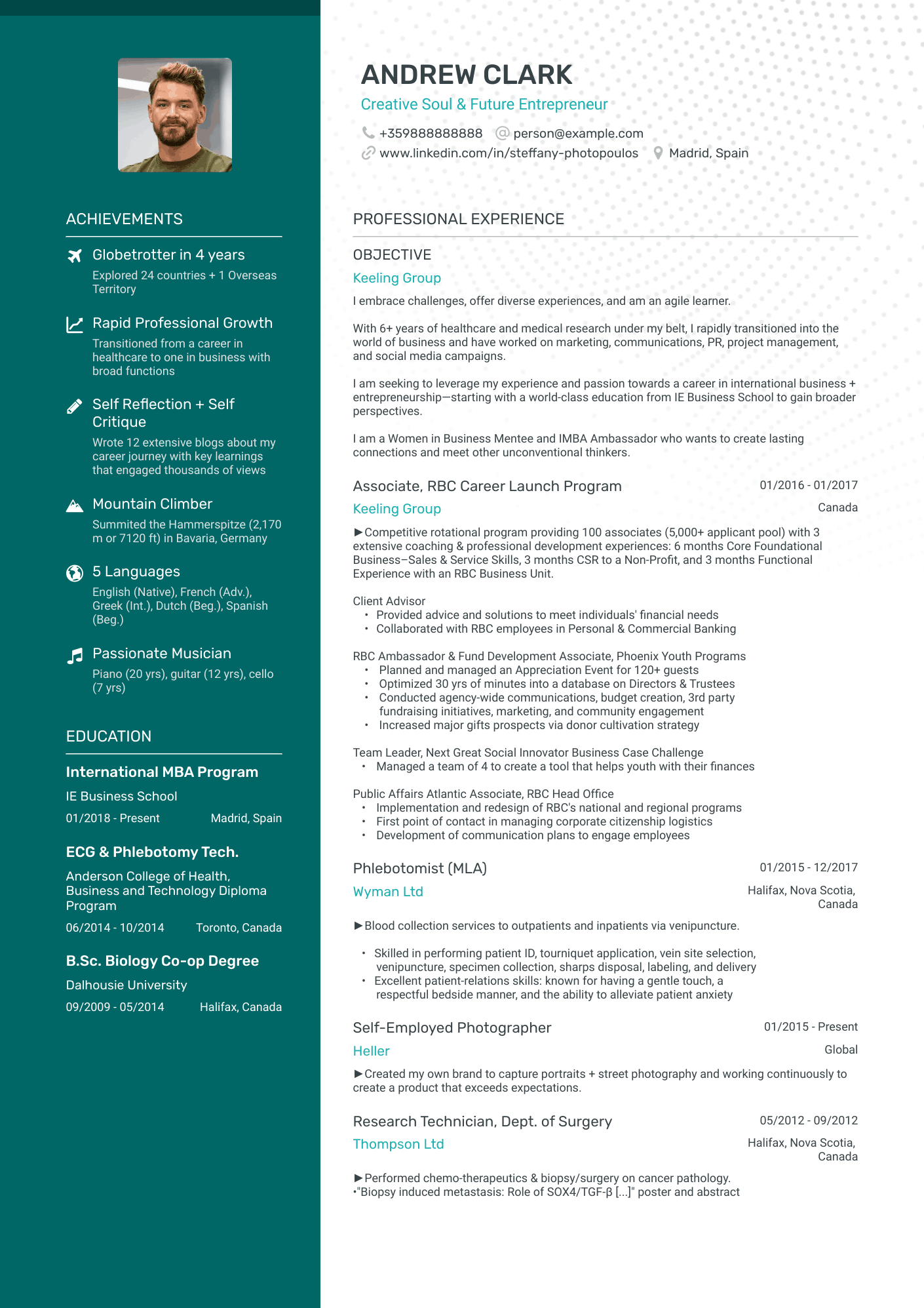Regardless of your role or industry, making a career change comes with many challenges.
You may not have all the skills or experience when you’re just starting out, so knowing how to market yourself is key.
That’s where your well-crafted CV comes in.
A career change CV highlights transferable skills, relevant experience, and your potential for success in a new field.
Potential employers need to see the value you will bring to their company. It is important to show them how you will impact success.
Read our guide to creating a career change CV and explore our examples. Then edit a template using our CV builder to create a CV that highlights your transferable skills.
Upload & Check Your CV
Drop your CV here or choose a file. PDF & DOCX only. Max 2MB file size.
Career change CV template to copy-paste and use
The best format and structure for a career change CV
Deciding on what CV format to use is an important part of the process. The best choice for you will depend on factors like role, experience, and industry.
Choosing the right CV format
One CV format you are likely already familiar with is the chronological format.
This is the most standard CV format and shows your work history and achievements in chronological order.
The chronological CV is a great choice for candidates with a lot of work experience in their field. However, that is not the case with career change CVs.
The best CV formats for career changers are the functional or combination CV.
Both of these formats focus on skills and qualifications over chronological work history. A great advantage if your industry experience is lacking.
A functional CV is skills-based and shows hiring managers the value you will bring to the role.
You have the opportunity to highlight transferable skills and show how the experience you do have will transfer to the new role.
A combination CV does exactly what the name implies. It combines the elements of different formats to best suit your needs.
This is a great option for candidates who do have some experience in their desired field, but not quite enough to be the main focus.
A combination CV spreads the focus across the skills, experience, and achievements that are most relevant to your target job.
The advantage of a combination CV is its flexibility which can be adapted to fit different career paths.
Explore our collection of CV templates to help you determine which is the best format for you.
Effective use of headings and sections
Clear headings and well-structured sections play an important role in career change CVs.
Headings and titles draw the eye to different sections and bring attention to the places you want it.
Every section of your CV should be clear and easy to read. Showcase relevant information and maintain a professional appearance with concise and organised sections.
Highlighting transferable skills on your career change CV
Transferable skills are the cornerstone of career change CVs.
They show potential employers how your skills from your previous roles will impact success at their company.
The first step in highlighting transferable skills in your CV is identifying which ones to include.
Identifying your transferable skills
Transferable skills are the skills you use in your current career that are valuable in your new career.
If you’re overwhelmed and aren’t sure where to begin, start by making two lists. One of your current skills and one of the key skills in your new industry.
Browse job listings in your desired field. What skills are required for the job you want? What skills are in demand in the industry?
Then, identify which of your own skills are relevant to your target job.
Demonstrating the relevance of your transferable skills
Now that you’ve identified your transferable skills, you must show hiring managers how they are relevant to your target job.
Simply listing your skills won’t be enough to show your value on a career change CV. Especially if there is a discrepancy in the application of those skills.
Showcase the applicability of your transferable skills to the requirements of the new role.
This can be done by providing context to your skills as in the example below.
The candidate in the example above provides specific examples and achievements for their highlighted skills.
Skills like “communication” and “leadership” can be open to interpretation. You don’t want to leave hiring managers to make their own assumptions.
Providing examples demonstrates how you’ve used your skills in the past and shows how you will use them in your target job.
Emphasising relevant experience on your career change CV - with or without relevant work history
Prioritising relevant work experiences
Breaking into a new industry doesn’t necessarily mean you have no relevant work experience.
Emphasise achievements and accomplishments that show your transferable skills.
For example, if you’re transitioning from a management position in service to a management position in sales, focus on experiences involving leadership, team management, and decision-making.
Highlight work experiences that showcase your ability to adapt and succeed in a new environment.
Showcasing volunteer work, internships, and side projects
Work history isn’t the only place to gain experience. Consider adding another section to your CV that shows your commitment to your new career path.
Volunteer work, internships, side projects, and many other experiences can be leveraged to show your experience in the industry.
Let’s look at an example below.
- •Answered phones for local emergency hotline during severe weather
- •Provided information on safety procedures, food and water resources, and emergency housing
- •Remained calm during stressful situations and spoke professionally to callers
Notice the various skills the candidate mentions in the example above.
These experiences are from volunteer work, but can easily be applied to industries like customer service, administrative tasks, and emergency services.
Let’s look at an example for a different section.
- •Used Python and JavaScript to develop free app
- •Gained 250 users in the first 6 months
- •Increased community engagement by 18%
The candidate in the example above may not have any experience working as a developer, but their personal project shows their success developing apps.
Projects can be used to show things like industry skills, technical knowledge, and product success.
The role of education and training on a career change CV
Work experience is important when seeking a job, but education and training also play a key role.
Relevant qualifications and certifications
Relevant qualifications and certifications can have a significant impact on a career change CV.
Formal education in your desired industry shows a commitment to your career and professional training.
Many roles and industries require that staff are certified to do their job. For example, licences to operate specialised machinery or prepare food in a safe environment.
Completing the certification process and adding it to your CV shows your readiness to work.
Seeking out certification training and programmes is a great way to enhance your career change CV when your work history is lacking.
Research your target role and find out if there are certain qualifications or certificates required by employers.
Determine if there is an official issuing organisation - like the Driver and Vehicle Licensing Agency - where the certification must be obtained.
The value of continuous learning
Taking it upon yourself to continuously develop skills and learn new technologies increases your employability.
It shows your commitment to your career and your value in a competitive job market. This is especially important in fields that are always evolving quickly like the tech sector.
Pursuing additional education doesn’t always have to result in a degree. Supporting your career change by learning new skills has a big impact on your CV.

10 online platforms where you can learn and develop new skills for your career change CV in 2025
- Coursera
- Udemy
- Skillshare
- LinkedIn Learning
- MasterClass
- Udacity
- Codecademy
- FutureLearn
- edX
- Pluralsight
Tailoring your CV for each application
No matter what type of job you’re applying for, always tailor your CV to your target job!
This may seem like a lot of extra work, but spending more time on a few targeted CVs is more effective than mass applying with a generic blanket CV.
Adapting your CV for different job roles
Customise your career change CV for each job application to showcase your most relevant skills and experiences.
This shows potential employers that you’ve done your research and are committed to the role. Even within the same industry, every company has its own unique needs and requirements.
Read the job application closely and take note of key words and phrases. Tailor each section of your CV to show companies why you’re the right candidate for the job.
Be mindful to write in key words naturally and not just copy and paste directly from the company website. This is lazy work that will be spotted straight away.
Never lie on your CV!
Tailoring does not mean writing things that aren’t true just to get the job. Highlight your most relevant experiences and skills, but always keep it truthful.
Researching your target industry
When deciding to make a career change, be sure to thoroughly research your new industry. This will help you to better understand its specific requirements and expectations.
Research companies in the industry and learn about market trends and standards.
Staying current on trends will help you determine what skills to develop and how to increase your employability.
Key takeaways for showing transferable skills on a career change CV
A well-crafted career change CV showcases your potential and increases your chances of securing interviews.
Identify your transferable skills and highlight your relevant experiences to show how you will adapt in your new industry.
Emphasise relevant volunteer work, internships, and projects to show relevant experience outside work history.
Research your new industry and develop your skills to increase your employability and show your commitment to your career.
Transitioning to a new career comes with challenges, but with perseverance and adaptability you will be well on your way to your new career path!




